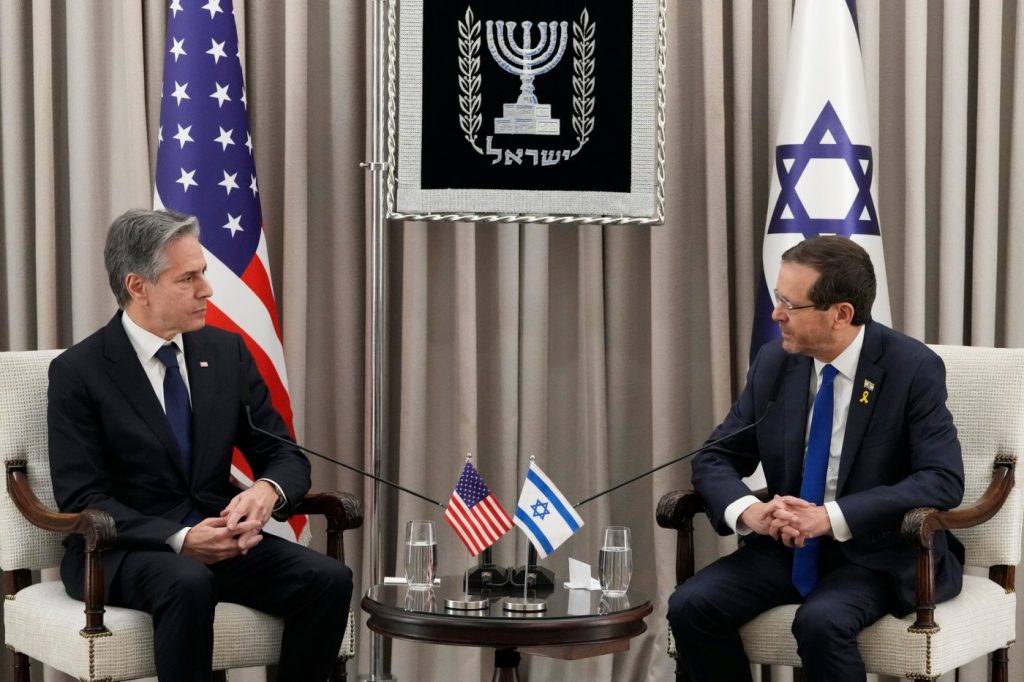By Matthew Lee, Wafaa Shurafa and Samy Magdy | Associated Press
TEL AVIV, Israel — Israeli Prime Minister Benjamin Netanyahu on Wednesday rejected Hamas’ terms for a cease-fire and hostage-release agreement, calling them “delusional” and leveling harsh criticism of any arrangement that leaves the militant group in full or partial control of Gaza after the war.
He vowed to press ahead with Israel’s war against Hamas, now in its fifth month, until achieving “absolute victory.”
Netanyahu made the comments shortly after meeting the visiting U.S. secretary of state, Antony Blinken, who has been traveling the region in hopes of securing a cease-fire agreement.
“Surrendering to Hamas’ delusional demands that we heard now not only won’t lead to freeing the captives, it will just invite another massacre,” Netanyahu said in a nationally televised evening news conference.
“We are on the way to an absolute victory,” he said, adding that the operation would last months, not years. “There is no other solution.”
He ruled out any arrangement that leaves Hamas in control of any part of Gaza. He also said that Israel is the “only power” capable of guaranteeing security in the long term.
Earlier, Blinken said that “a lot of work” remains to bridge the gap between Israel and Hamas on terms for any deal. He was expected to hold his own news conference later Wednesday.
Hamas laid out a detailed, three-phase plan to unfold over 4 1/2 months, responding to a proposal drawn up by the United States, Israel, Qatar and Egypt. The plan stipulates that all hostages would be released in exchange for hundreds of Palestinians imprisoned by Israel, including senior militants, and an end to the war.
Israel has made destroying Hamas’ governing and military abilities one of its wartime objectives, and Hamas’ proposal would effectively leave it in power in Gaza and allow it to rebuild its military capabilities.
U.S. President Joe Biden said Hamas’ demands are “a little over the top” but that negotiations will continue.
The deadliest round of fighting in the history of the Israeli-Palestinian conflict has killed over 27,000 Palestinians, leveled entire neighborhoods, driven the vast majority of Gaza’s population from their homes and pushed a quarter of the population to starvation.
Iran-backed militant groups across the region have conducted attacks, mostly on U.S. and Israeli targets, in solidarity with the Palestinians, drawing reprisals as the risk of a wider conflict grows.
Israel remains deeply shaken by the Oct. 7 attack in which Hamas militants burst through the country’s vaunted defenses and rampaged across southern Israel, killing some 1,200 people, mostly civilians, and abducting some 250, around half of whom remain in captivity in Gaza.
Blinken, who is on his fifth visit to the region since the war broke out, is trying to advance the cease-fire talks while pushing for a larger postwar settlement in which Saudi Arabia would normalize relations with Israel in return for a “clear, credible, time-bound path to the establishment of a Palestinian state.”
But the increasingly unpopular Netanyahu is opposed to Palestinian statehood, and his hawkish governing coalition could collapse if he is seen as making too many concessions.
“There’s a lot of work to be done, but we are very much focused on doing that work,” Blinken told Israel’s ceremonial president, Isaac Herzog.
MISERY DEEPENS IN DEVASTATED GAZA
There is little talk of grand diplomatic bargains in Gaza, where Palestinians yearn for an end to fighting that has upended every aspect of their lives.
“We pray to God that it stops,” said Ghazi Abu Issa, who fled his home and sought shelter in the central town of Deir al-Balah. “There is no water, electricity, food or bathrooms.” Those living in tents have been drenched by winter rains and flooding. “We have been humiliated,” he said.
New mothers struggle to get baby formula and diapers, which can only be bought at vastly inflated prices if they can be found at all. Some have resorted to feeding solid food to babies younger than 6 months old despite the health risks it poses.
The Palestinian death toll from four months of war has reached 27,707, according to the Health Ministry in the Hamas-run territory. That includes 123 bodies brought to hospitals in just the last 24 hours, it said Wednesday. At least 11,000 wounded people need to be urgently evacuated from Gaza, it said.
The ministry does not distinguish between civilians and combatants in its figures but says most of the dead have been women and children.
Israel has ordered Palestinians to evacuate areas that make up two-thirds of the tiny coastal territory. Most of the displaced are packed into the southern town of Rafah near the border with Egypt, where many are living in squalid tent camps and overflowing U.N.-run shelters.
Hamas has continued to put up stiff resistance across the territory, and its police force has returned to the streets in places where Israeli troops have pulled back. Hamas is still holding over 130 hostages, but around 30 of them are believed to be dead, with the vast majority killed on Oct. 7.
HAMAS SPELLS OUT DEMANDS FOR HOSTAGE DEAL
Hamas’ response to the cease-fire proposal was published in Lebanon’s Al-Akhbar newspaper, which is close to the powerful Hezbollah militant group.
A Hamas official and two Egyptian officials confirmed its authenticity. A fourth official familiar with the talks later clarified the sequencing of the releases. All spoke on condition of anonymity because they were not authorized to brief media on the negotiations.
In the first 45-day phase, Hamas would release all remaining women and children, as well as older and sick men, in exchange for an unspecified number of Palestinian prisoners held by Israel. Israel would also withdraw from populated areas, cease aerial operations, allow far more aid to enter and permit Palestinians to return to their homes, including in devastated northern Gaza.
The second phase, to be negotiated during the first, would include the release of all remaining hostages, mostly soldiers, in exchange for all Palestinian detainees over the age of 50, including senior militants. Israel would release an additional 1,500 prisoners, 500 of whom would be specified by Hamas, and complete its withdrawal from Gaza.
In the third phase, the sides would exchange the remains of hostages and prisoners.
Netanyahu has said he will not secure a deal at any cost, signaling he would not agree to the release of senior militants.
ISRAELIS AGONIZE OVER FATE OF CAPTIVES
Related Articles
Ceasefire debate comes to Gilroy
Biden chides Congress to ‘show some spine’ against Trump
Qatar: Hamas has ‘generally positive’ response to cease-fire proposal
Kristof: What can we possibly say to the suffering children of Gaza?
Far-right Israel minister suggests that Trump would give more US support to offensive in Gaza
Israelis are intensely focused on the plight of the hostages, with family members and the wider public demanding a deal with Hamas, fearful that time is running out. Israeli forces have only rescued one hostage, while Hamas says several were killed in Israeli airstrikes and failed rescue missions.
More than 100 hostages, mostly women and children, were freed during a weeklong cease-fire in November in exchange for the release of 240 Palestinians imprisoned by Israel.
Thousands of Israelis have taken part in weekly protests calling for the release of the hostages and demanding new elections. But Netanyahu is beholden to far-right coalition allies who have threatened to bring down the government if he concedes too much in the negotiations.
That could spell the end of Netanyahu’s long political career and expose him to prosecution over long-standing corruption allegations.
Shurafa reported from Deir al-Balah, Gaza Strip and Magdy from Cairo. Associated Press writer Abby Sewell in Beirut contributed to this report.


